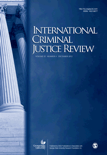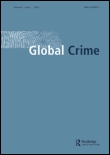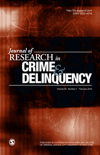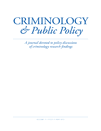
Trends in Organized Crime
Scope & Guideline
Exploring the Complexities of Organized Crime
Introduction
Aims and Scopes
- Interdisciplinary Research on Organized Crime:
The journal emphasizes the importance of multidisciplinary approaches, combining insights from criminology, sociology, law, and economics to understand the complexities of organized crime. - Empirical Analysis of Crime Trends:
A consistent focus on empirical studies that analyze crime patterns, trends, and the socio-economic factors influencing organized crime activities across different regions. - Exploration of Criminal Networks and Structures:
Research often investigates the structures, relationships, and operational methods of organized crime groups, providing insights into their functioning and impacts on communities. - Policy and Governance Implications:
The journal addresses the implications of organized crime for policy-making and governance, offering recommendations for law enforcement and public policy to combat organized crime effectively. - Focus on Emerging and Digital Crimes:
Increasing attention is paid to the emergence of cybercrime and the digital transformation of organized crime, exploring how technology influences criminal activities.
Trending and Emerging
- Digital and Cyber Organized Crime:
Increasing publications on cybercrime and digital networks indicate a significant shift toward understanding how technology facilitates organized crime, including ransomware and online trafficking. - Human Trafficking and Exploitation:
A growing emphasis on human trafficking, particularly in relation to sexual exploitation and labor trafficking, reflects heightened awareness and research interest in these critical issues. - Environmental and Wildlife Crimes:
Emerging research on environmental crimes, including illegal wildlife trafficking and ecological harm, signifies a trend towards recognizing the intersection of organized crime and environmental degradation. - Gender Dynamics in Organized Crime:
Recent studies exploring the role of women in organized crime and the gendered dimensions of criminal networks indicate a significant trend towards understanding how gender influences criminal participation and victimization. - Transnational Crime and Migration Issues:
An increasing focus on the nexus between organized crime and migration, particularly in the context of human smuggling and trafficking, highlights the global nature of organized crime today.
Declining or Waning
- Traditional Mafia Structures:
There has been a noticeable decline in studies exclusively focused on traditional Mafia organizations, such as the Italian Mafia, as attention shifts toward more diverse forms of organized crime. - Localized Case Studies:
Fewer localized case studies are being published, suggesting a movement away from in-depth examinations of specific geographic regions toward broader, comparative analyses. - Historical Perspectives on Organized Crime:
Research that focuses on historical perspectives and the evolution of organized crime is becoming less common, potentially overshadowed by contemporary issues and case studies. - General Overviews of Crime Prevention Strategies:
There seems to be a decrease in articles providing general overviews of crime prevention strategies, with more focus now on specific case studies and empirical evidence. - Discussion of Low-Level Crime Networks:
The exploration of low-level crime networks, such as petty theft or minor drug offenses, appears to be waning as the journal increasingly prioritizes more severe forms of organized crime.
Similar Journals

Revija za Kriminalistiko in Kriminologijo
Advancing Knowledge in Criminalistics and CriminologyRevija za Kriminalistiko in Kriminologijo is a prominent academic journal dedicated to the fields of criminalistics, criminology, law, and forensic medicine, published by the Ministry of Interior Republic Slovenia. With its inception in 1981, the journal has served as a pivotal platform for disseminating research findings and innovative ideas relevant to crime and justice issues, particularly in the context of Slovenia and the wider region. Despite its current Q4 ranking in various categories, including Law and Pathology & Forensic Medicine, Revija za Kriminalistiko in Kriminologijo remains essential for emerging scholars and professionals seeking to contribute to the discourse in forensic science and social psychology. Although the journal does not offer open access options, it continues to publish rigorous peer-reviewed articles that significantly impact the field, making it a valuable resource for researchers, practitioners, and students alike. Scholars can access the research at the journal's address in Ljubljana, Slovenia, thereby fostering interdisciplinary collaboration and knowledge sharing.

Journal of Penal Law and Criminology-Ceza Hukuku ve Kriminoloji Dergisi
Advancing Understanding of Justice and CrimeThe Journal of Penal Law and Criminology-Ceza Hukuku ve Kriminoloji Dergisi, published by ISTANBUL UNIV, is a prestigious platform dedicated to the advancement of knowledge in the fields of criminal law and criminology. With its Open Access policy adopted since 2017, it aims to promote the dissemination of research findings and theoretical discussions, ensuring that vital insights in criminal justice, legal reforms, and criminological studies are accessible to a global audience. This journal serves as a vital resource for academics, legal practitioners, and students alike, fostering interdisciplinary dialogue and encouraging innovative research. By focusing on contemporary issues in penal law and criminology, the journal enhances understanding and addresses the complexities of justice in a rapidly changing society. With an ISSN of 2148-6646 and an E-ISSN of 2602-3911, it continuously strives to maintain high scholarly standards and relevance in its contributions to the field.

International Criminal Justice Review
Illuminating pathways in criminal justice scholarship.International Criminal Justice Review is a premier journal in the field of law, published by SAGE Publications Inc, renowned for its commitment to advancing the understanding of criminal justice issues on a global scale. With an ISSN of 1057-5677, this journal spans a rich history from its inception in 1991 to its ongoing contributions into 2024, supporting a diverse array of research that addresses both theoretical and practical concerns in international criminal law. The journal holds a prestigious Q1 ranking in the Law category for 2023, reflecting its influence and relevance, as evidenced by its impressive Scopus rank of #68 out of 1025 in the Social Sciences Law field, placing it in the 93rd percentile. Though not an open-access journal, it provides vital access options for institutions and individuals alike. International Criminal Justice Review serves as a critical resource for researchers, practitioners, and students dedicated to exploring the complexities of international criminal justice systems, offering a platform for innovative scholarship that informs policy and practice worldwide.

Asian Journal of Criminology
Innovating Insights into Crime and Society in AsiaAsian Journal of Criminology, published by SPRINGER, stands as a pivotal platform for scholarly communication within the field of criminology, boasting a notable impact factor and achieving a distinguished Q1 ranking in Law for 2023. Located in the Netherlands, this journal addresses the complexities of crime and justice in Asian contexts, fostering interdisciplinary discourse between researchers, practitioners, and policymakers. Since its inception in 2006 and continuing through to 2024, the journal has published a range of high-quality articles that explore theoretical frameworks, empirical research, and practical applications in criminology. Although the journal is not open access, it remains accessible through academic libraries and institutions, ensuring its wide reach among scholars and students. With a Scopus ranking of 143 out of 1025 in the field of Social Sciences Law, placing it in the 86th percentile, the Asian Journal of Criminology is essential for anyone looking to stay at the forefront of criminological research and its application in diverse societal contexts.

Global Crime
Unraveling Crime's Global Tapestry Through Scholarly InsightGlobal Crime is a leading scholarly journal published by Routledge Journals, Taylor & Francis Ltd, focusing on the multifaceted dimensions of crime and justice on a global scale. With an ISSN of 1744-0572 and E-ISSN of 1744-0580, this journal serves as a critical platform for researchers, practitioners, and policymakers interested in the intersection of legal studies, political science, and sociological perspectives. The journal boasts a prestigious Q1 ranking in Law and notable Q2 rankings in Political Science and International Relations, as well as Sociology, highlighting its influential role in shaping academic discourse. In 2023, it ranked #88 out of 1025 journals in Law, placing it in the 91st percentile, thus ensuring its status as an essential resource for those engaged in advanced research. While it does not currently offer open access options, Global Crime continuously seeks to illuminate the complexities of crime, fostering a better understanding through comprehensive studies, critical analyses, and innovative approaches. By converging insights from various disciplines, the journal aims to facilitate dialogue among academics and practitioners alike, ultimately advancing the field of criminal justice globally.

Salus Journal
Championing Interdisciplinary Approaches in HealthcareSalus Journal, published by Charles Sturt University, is an esteemed open-access journal dedicated to advancing the field of health sciences. Established in 2013, this journal emphasizes the dissemination of innovative research and critical analyses that influence evidence-based practices in healthcare and wellness. With its commitment to making high-quality research accessible to a global audience, Salus Journal plays a crucial role in fostering academic collaboration and dialogue among researchers, professionals, and students alike. Its focus on interdisciplinary approaches encourages contributions across various domains of health, ensuring that it remains a vital resource for the community. The journal is easily accessible online, promoting the visibility and impact of published works. For more information and to stay updated with the latest research in health sciences, visit their website and explore the wealth of knowledge available.

Russian Journal of Criminology
Bridging cultural perspectives in the study of criminology.Russian Journal of Criminology (ISSN: 2500-4255, E-ISSN: 2500-1442) is an esteemed academic publication hosted by Baikal State University, dedicated to advancing the field of criminology. As a pivotal resource within the domains of law and social sciences, this journal offers a platform for scholars to disseminate innovative research, critical analyses, and comprehensive studies relevant to contemporary criminological issues. Although coverage has been discontinued in Scopus from 2020, the journal continues to provide valuable insights essential for professionals and researchers alike, with a focus on sociological and political perspectives on crime and justice systems. With its unique Russian context, the journal encourages a diverse array of submissions, facilitating a cross-cultural dialogue on criminology that contributes to global scholarship. Despite its current ranking of 478 out of 685 in law and 908 out of 1243 in sociology and political science, the Russian Journal of Criminology remains a vital resource for those seeking to explore the complexities of criminological phenomena and to further the academic discourse in this critical area of study.

JOURNAL OF RESEARCH IN CRIME AND DELINQUENCY
Advancing the understanding of crime and its complexities.JOURNAL OF RESEARCH IN CRIME AND DELINQUENCY, published by SAGE PUBLICATIONS INC, stands as a premier outlet for groundbreaking research in the fields of crime and delinquency. With an ISSN of 0022-4278 and an E-ISSN of 1552-731X, this esteemed journal has been disseminating vital knowledge since 1964 and continues to do so with a forward-looking perspective extending to 2024. Renowned for its impactful contributions, the journal ranks in the Q1 quartile of Social Psychology for 2023, reflecting its status among the top-tier publications in the field with a Scopus ranking of 66/310, placing it in the 78th percentile. Though it is not an Open Access journal, it remains a crucial resource for researchers, professionals, and students seeking to deepen their understanding of criminal behavior and social responses. With articles that address current issues and trends, JOURNAL OF RESEARCH IN CRIME AND DELINQUENCY plays an essential role in shaping policies and practices within the criminal justice system and academia.

Criminology & Public Policy
Driving Interdisciplinary Dialogue on Crime and JusticeCriminology & Public Policy, published by Wiley, is an esteemed journal that plays a pivotal role in the interdisciplinary fields of law, public administration, and literature. With a focus on innovation and empirical research, this journal addresses critical issues surrounding crime and justice while influencing policy decisions globally. The journal boasts a prestigious impact factor, reflecting its significant contribution to academic discourse, particularly noted for its top quartile rankings in the fields of Law, Literature and Literary Theory, and Public Administration in 2023. As a resource for researchers, practitioners, and policymakers, Criminology & Public Policy aims to bridge the gap between theory and practical application, presenting cutting-edge analyses and insights that are vital for addressing contemporary societal challenges. By providing a platform for rigorous scholarship, this journal supports the advancement of knowledge and fosters informed discussions that shape effective public policies.

Revista General de Derecho Penal
Exploring the frontiers of penal justice.Revista General de Derecho Penal, published by IUSTEL, is a premier academic journal dedicated to the dynamic field of criminal law. With an ISSN of 1698-1189, this journal serves as a crucial platform for researchers, legal professionals, and students to share their insights and findings related to penal law and its evolving applications in contemporary society. Although it is not an open access journal, it maintains high scholarly standards, helping to advance discourse in legal studies. The journal's address is C PRINCESA NO 29, 2A DCHA, MADRID 28008, SPAIN, positioning it within a vibrant academic community. With a focus on current legal challenges and theoretical advancements, Revista General de Derecho Penal plays an essential role in fostering understanding and developing effective legal frameworks in criminal justice, making it an invaluable resource for those engaged in the study and practice of law.